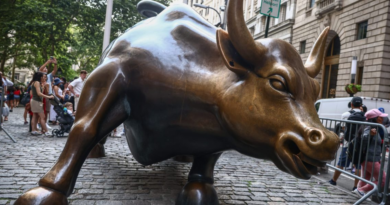How one company justified a million-dollar logo redesign inspired by the Mona Lisa—and moved just two wavy lines: ‘Surely this is satire’
The universe’s highest echelon of art contains the following: the golden ratio, reflecting the “divine” in both nature and mathematics; Leonardo Da Vinci’s Mona Lisa and the Vetruvian Man, demonstrating the ideal human physiology—and, of course, the Pepsi logo.
At least, this is the story told by a 27-page design document of a 2008 brand refresh from the beverage juggernaut. In the document, design agency the Arnell Group thoroughly outlined the rationale behind Pepsi’s brand refresh: first establishing the desire to show innovation, then reviewing the evolution of art from Pythagorean “spatial harmonies” to Renaissance art, until deriving the perfect new design that reflects the path of the Sun’s light in Earth’s gravitational pull. The final logo would illustrate the “Gravitational Pull of Pepsi.”
“The Pepsi ethos has evolved over time,” the document said. “The vocabulary of truth and simplicity is a reoccurring phenomena in the brand’s history. It communicates the brand in a timeless manner and with an expression of clarity.”
The result of the radical rebrand? Pepsi’s same red, white, and blue circular logo, but with its white center stripe undulating at a slightly different angle than its predecessor.
Even 15 years after that change—and a March 2024 global rebranding that returned the white center to its original squiggly shape—the 2008 design document circulates around social media, prompting viral TikToks, do-it-yourself recreations on graphing calculators, and eliciting genuine shock. Piling onto the absurdity of the rationale accompanying Pepsi’s 2008 logo is the redesign’s $1 million price tag.
“Surely this is satire! Pepsi gravitational pull?!” one Reddit user wrote about the 2008 redesign.
According to Emily Zugay, a “self-proclaimed” (and university-trained) graphic designer who parodies company logos on her TikTok with 4.3 million followers, Pepsi’s seemingly absurd brand refresh is actually pretty common practice.
“When these companies are spending thousands of dollars on these redesigns—even if it’s something that could take five minutes—they feel like they need to justify it, even to themselves, sometimes with a document like that: comparing it to the Mona Lisa to show this was worth the money,” she told Fortune.
But the enduring chatter around Pepsi’s old logo is at the nexus of the company’s modern marketing philosophy, according to Venky Shankar, professor of marketing at Southern Methodist University’s Cox School of Business who worked with Pepsi to design a global forecast system for the company. The discourse around Pepsi’s previous rebranding may be in jest, but the precipitating business factors and industry trends are very real.
“All brands look for a refresh when their sales are not growing as fast as they expected to,” Shankar said. “In this case, carbonated beverages, particularly sodas, have been witnessing a downward trend for a very long time, not just the last few years alone.”
Pepsi’s 2008 rebrand was no exception: In October that year, two months after the Arnell Group submitted its redesign document to the company, Pepsi reported disappointing earnings due to poor drink sales, a result of a weakened economy, and announced plans to lay off 3,300 workers, about 1.8% of its workforce.
The impetus for Pepsi’s 2023 redesign is also clear. Despite better-than-expected revenue, sales have been hindered in the U.S. by consumers thrown off by the company’s price increases. Gen Z consumers in particular have also lost their taste for sugary soda, instead preferring healthier fizzy alternatives. Pepsi has tapped rappers like Ice Spice to push its lemon-lime soda and launched a new line of bubly sparkling water in a bid for young consumers. Pepsi’s new logo makes a similar appeal to Gen Z with its retro vibes.
“Pepsi has constantly reimagined and reinvented our logo over the years—as a brand that is both timely and timeless we’ve evolved our look and feel just as our fans and consumers have evolved along with us,” the company told Fortune in a statement. “The visual identity introduced in 2008 has been very successful for us over the past 14 years of the brand. That said, in 2023 we introduced the next era of Pepsi.”
Arnell Group did not respond to Fortune’s request for comment.
Rebrand stumbles
PepsiCo’s marketing refreshes haven’t always reflected Da Vinci-caliber genius. In tandem with the rollout of its new Pepsi logo in the late aughts, the parent company also refreshed its Tropicana branding. The juice brand, a subsidiary of Pepsi from 1998 to 2021, removed its front-and-center logo in favor of a tall glass of orange juice. Social media, then in its early days, hated the design.
“Do any of these package-design people actually shop for orange juice?” one angry customer wrote over email, the New York Times reported in 2009. “Because I do, and the new cartons stink.”
But it wasn’t an online uproar that prompted the company to revert back to its original logo shortly after the redesign. It was the 20% sales plummet that followed the month after.
Pepsi’s misstep had shared flavors with Coca-Cola’s 1985 “New Coke,” when the beverage company announced it would change its drink formula for the first time in almost a century. Consumers revolted, leaving 31,600 calls on the company’s hotline, but the anger also cemented Coca-Cola’s stature, according to its blog, as “obviously more than just a soft drink.”
In fact, plenty of big marketing swings fail to pay off. One of Pepsi’s biggest online blunders came in 2017, when the company aired an ad with protesters laughing and cheering, that concludes with Kendall Jenner passing out a Pepsi can to a police officer. The ad borrowed imagery from the Black Lives Matter movement protesting police brutality and was largely considered tone deaf. The company later apologized, but not before memes of the ad spread widely online.
“Pepsi was trying to project a global message of unity, peace and understanding. Clearly, we missed the mark and apologize,” Pepsi said at the time.
Shankar argued corporations walk a fine line with being made fun of online: “In a consumer product like Pepsi, if people are making too much fun of it and it starts hurting the existing consumers, that could be a problem,” he said.
Was it all worth it?
While Pepsi’s 2017 ad generated enough uproar to have negative consequences, the continued fervent meme-ing of Pepsi’s old logo is not likely to be seen as a threat to the company, Shankar said.
Drawing on the old adage of “any publicity is good publicity,” Shankar believed that in the case of a buzzy rebranding, however mocked it is, means good news for Pepsi. Indeed, social media has changed the marketing game as brands lean into the absurdity of Gen Z humor to get more eyes on their products. Twitter memes have resulted in beverages like Josh Cellars wine and Cerveza Cristal beer essentially receiving free marketing. Zugay, the TikToker, has experienced this phenomenon firsthand. Her intentionally shoddy recreations of big-name logos have been reposted and used as social media profile pictures by brands like McDonald’s, Tinder, and the NFL.
“People really resonate with that and enjoy that,” she said. “Because it shows that brand isn’t untouchable—at least on Tiktok.”
But for Pepsi in particular—which has waged war with Coca-Cola for decades—brand loyalty may have ratcheted up the clamor around the logo.
“A lot of times people view logos and brands as precious to themselves or they almost feel a sense of ownership over the look of a logo or the brand itself, if they’ve been a loyal customer for however long,” Zugay said. “People, I feel like, are very sensitive when it comes to logos and rebrand specifically.”
Pepsi loyalists have already shown that regardless of the reputation the company’s rebrands have, they’ll stay true to their cola of choice. As one Reddit user put it, “When I walk down the drink aisle I unfortunately always succumb to pepsi’s gravitational pull.”




